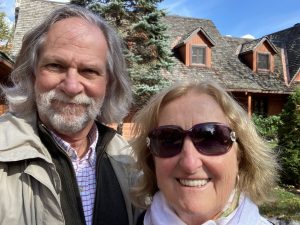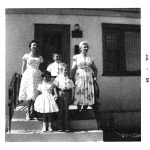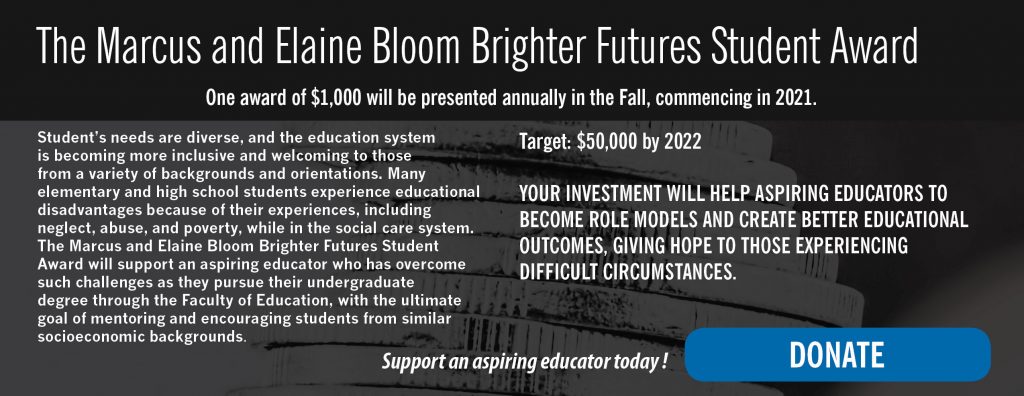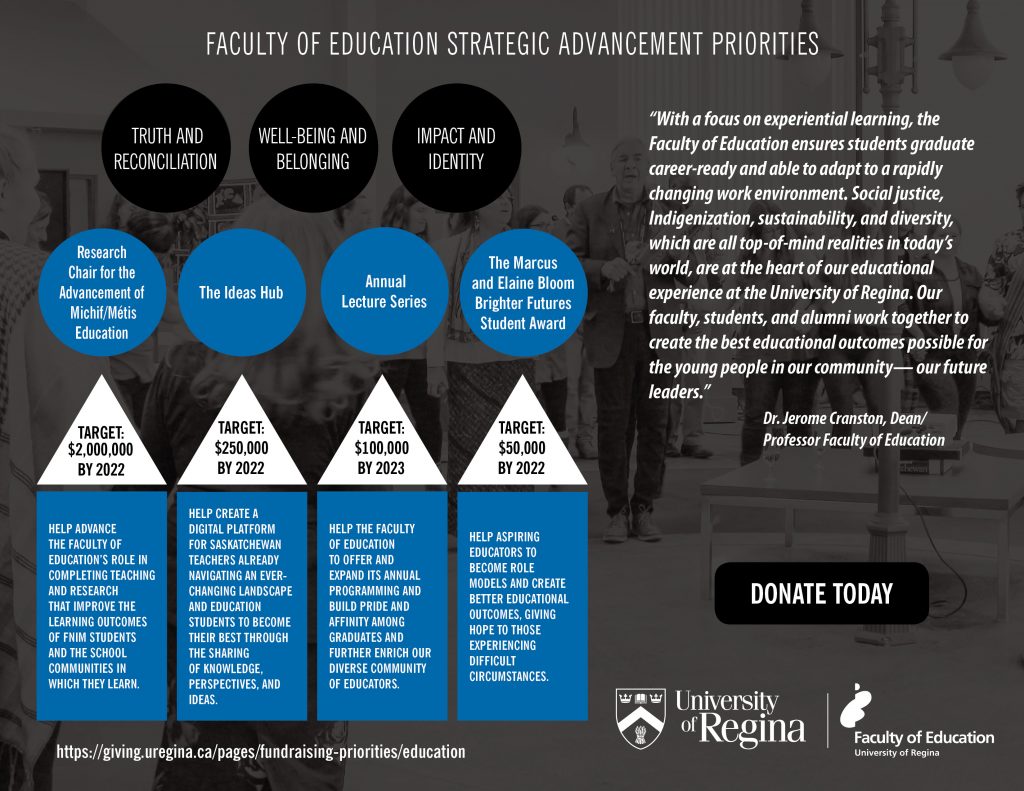The Florence & Grace Donison Bursary in Education

The impact of student awards is matched only by the powerful stories behind them—stories about the donors who had a deeply personal motivation to create them, the loved ones in whose honour they were named, and the student recipients whose lives have been changed for the better because of it. The Florence & Grace Donison Bursary in Education is no exception.
Remembering who Florence and Grace were will give a richer understanding of why the University of Regina alumnus Dr. David Bloom, who holds a Bachelor of Science degree, had a strong desire to establish the bursary in support of Education students.
Growing up in what was a Romanian ethnic enclave in Wood Mountain, Saskatchewan, Bloom’s grandmother Florence Precopciuc married a farmer, Constantin Donison, at age 15, with two daughters following. Having lived through the drought-stricken years of the Dust Bowl, and during a much different time in our history when running a farm was socially deemed as “men’s work,” Florence—who had no sons to help out on the farm—resolved to come to Regina where she worked and raised her two daughters, Elaine and Grace, on her own after her husband’s death.
The Romanian-born woman’s upbringing in poverty and lack of education did not deter her from teaching herself to read, write, and improve her English fluency. Listening to the radio and reading the newspaper were lifelong routines that were integral to her learning, as well as her ability to keep a pulse on local and global events.
In her adulthood, Elaine married a cinema manager, Marcus Bloom, and over the years, they welcomed three children, Joseph, David and Moira into the world. Tragically, they lost their mother due to illness when they were young, and their grieving father passed away not long afterward, caused by what Bloom believes was “a broken heart.”

The orphaned Bloom and his siblings were left to be raised by their grandmother and aunt Grace. The family’s apartment may have been small, but the love inside its walls was abundant. Bloom always held great admiration for his grandmother and aunt who co-parented him and his siblings. One memory that always comes back to him is how their primary caregivers consistently modelled a culture of reading, curiosity, and self-education in the household.
Another fond childhood memory Bloom cherishes is of the Regina Public Library’s bookmobile rolling into his neighborhood in Gladmer Park every Friday afternoon, and him signing out non-fiction books that fueled his passion for Canadiana, particularly French-Canadian history—a passion that was not outweighed by his ambition to become a doctor and devote his life to helping others.
Having watched his grandmother educate herself and independently become literate instilled the confidence in Bloom to chase that ambition, which led him to take his pre-med studies at the University of Regina where he double majored in Biology and Chemistry, with a minor in History. Financially disadvantaged, he was honoured to receive assistance by way of scholarships that covered his four years of tuition.
The generosity of the donors who had made those scholarships possible, breaking down economic barriers to ensure students like Bloom could succeed, was met with overwhelming gratitude that endured throughout the life of the then aspiring medical doctor. These gifts also planted a seed deep within Bloom’s heart to one day pay it forward and help others—just as other University of Regina donors, whom he will never forget, had helped him.
Bloom went on to complete his medical degree at Queen’s University in Kingston, Ontario, and subsequently his studies in psychiatry at McGill University in Montreal. Although the self-declared “prairie boy” had planned to return to Saskatchewan and practise psychiatry, the pull to live in Quebec—the province he had spent years reading and dreaming about in his youth—would be too strong to resist.
Bloom and his wife Suzanne made their home in Montreal, where they raised their two sons. Whatever distance may separate Bloom from Regina physically is not nearly enough to separate him emotionally from his alma mater; to this day, he remains a vital part of our university community, as well as a committed member of our donor family.
“I view teachers as the backbone of our society and I view donors to the Faculty of Education (among others) as living supports for the precious work of teaching,” says Bloom, who is in his 37th year of teaching at McGill as an assistant professor in the Faculty of Medicine, Department of Psychiatry and the Chief of the Psychosis Program at the Douglas Institute. “If we can give to others, then it’s the right thing to do as a University of Regina alumnus, and a Canadian citizen. I believe it’s our duty to take care of our brothers and sisters, improve the fairness and equity of opportunity in our society regardless of one’s financial circumstances, and offer a beacon of hope to the current generation for a better future.”
“The inspiration to create the Florence & Grace Donison Bursary in Education came from my desire to honour the memory of my beloved grandmother and aunt in a meaningful and lasting way.” Bloom goes on to say, “the purpose was to help out deserving people who may not necessarily have the grades to win a scholarship, but have the potential to become admirable teachers.”

Among such deserving people is Kayla Ward, recent alumna of the University of Regina and Saskatchewan Urban Native Teacher Education Program (SUNTEP). SUNTEP was established to ensure that people of Métis and non-status First Nations ancestry are adequately represented in urban teaching positions.Interestingly enough, both the founder and recipient of the Florence & Grace Donison Bursary in Education share something special in common—both were raised by their grandmothers, and saw their share of struggle.
“My grandmother and I were never well off financially,” says Kayla, who is of Métis (from Lebret) and Cree (from Peepeekisis Cree Nation) descent. “I began working at the young age of 15, and have paid my own way ever since. Receiving bursaries like the one Dr. Bloom established has allowed me to focus my time and energy on my academics, rather than my finances and working a second part-time job.
“With the help of his and other bursaries, I managed to maintain a high grade-point average and finish my degree with great distinction,” adds the Coronation Park Community School teacher. “Now, I strive to make a difference in children’s lives, just like the teachers before me have in mine. SUNTEP taught me the importance of integrating culture and identity into our teachings, which ultimately fostered my passion to teach children about the true history of Canada, and the importance of identity.”
Named bursaries and other academic awards are a testament to how acts of kindness can not only change the lives of others, but also touch their hearts forever. The Florence & Grace Donison Bursary in Education will endure as a memorable expression of Bloom’s admiration and love for his grandmother and aunt, a heartfelt tribute to the memory of two remarkable women, and a symbol of philanthropy.
“This bursary will continue to help many others in the future, and provide them with extra help that will be instrumental in their academic and career success, as it was in mine,” says Kayla. “For that, I am eternally grateful.”


